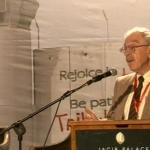Love of neighbor is not a policy. Keeping the fourth commandment (third for Roman Catholics) is not a policy. I may love my neighbor by taking out his trash, but chances are he does not think I do not love him if I leave his trash alone. Likewise, I may want to make sure that Americans do not violate God’s law as in the case of not working on Sundays (a whole new solution to the NFL and bended knees). But we did try to implement God’s law in public policy. We called that experiment Blue Laws. The thing is, the Old Testament does not say whether eating out at a restaurant or mowing the grass is something that should be a felony or misdemeanor.
What does any of this have to do with Leith Anderson? Mr. Anderson is the president of the National Association of Evangelicals and the main ecumenical body of born-again Protestants has just determined to oppose changes to the Affordable Care Act. According to Anderson (from a story at ThinkProgress):
“Despite its impressive achievements, our health care system often fails to deliver affordable, life-saving help to many of our citizens,” NAE president Leith Anderson said in a statement. “Reforms are needed, but they should be carefully studied and not rushed through Congress without expert analysis and thorough debate on the inevitable trade-offs inherent in any reform. Above all, any policy and funding changes should be evaluated by how they treat the most vulnerable among us.”
This means that evangelicals and liberal Protestants (whose ecumenical agency is the National Council of Churches) are seeing eye to eye on parts of public policy:
“There is not a single Member of Congress who does not understand that Graham-Cassidy will result in fewer people with health insurance and reduced spending on Medicaid,” Jim Winkler, president of the NCC, said in a separate statement distributed in the same email. “This bill will create unnecessary hardship for millions of our people. As Christian leaders, we cannot possible support legislation that will hurt the last, the least, and the lost.”
What puzzles some of us who believe that Christian pastors and their churches are supposed to minister the word of God is what gives either Anderson or Winkler the authority to weigh in on health insurance. Anderson himself admits that reform of ACA requires “expert analysis.” So has either the NAE or the NCC hired policy experts to determine the best way to go forward? That would cost some money.
In the meantime, both Protestant organizations issue statements and thereby give the impression that Christianity takes a side in the political debate about how to fund health care. No one is actually saying, not even conservatives, that people without means should, as the American way or the Christian ideal, be denied access to medicine. But the mixing of moral imperative with Christian authority leads some to think that Christianity favors the Affordable Care Act. And with that comes the implication that anyone who reforms ACA in a way that Christians oppose is doing something against the gospel.
In other words, lacking a “thus saith the Lord” from the Bible — it’s the 500th anniversary of the Reformation people (remember sola Scriptura?) — we can now make Christianity support a particular policy or legislation.
Such pronouncements do not help. They only raise the stakes. At a time when politics has become increasingly shrill and divisive thanks to the self-assured righteousness of many activists, evangelicals now add another topic to the list of matters that are black and white, either good or wicked.












